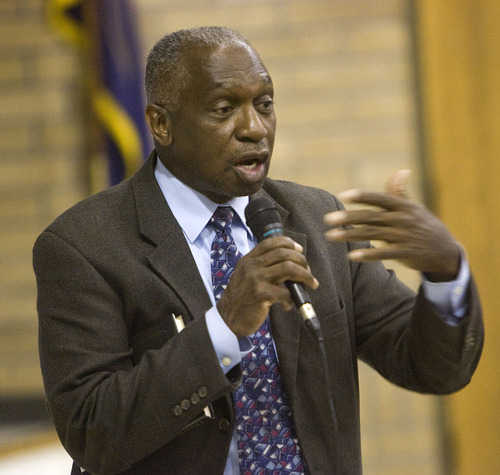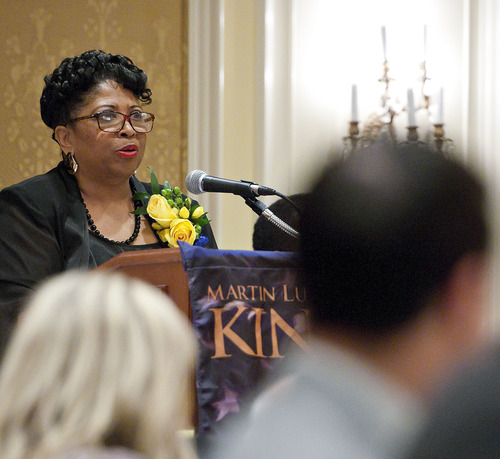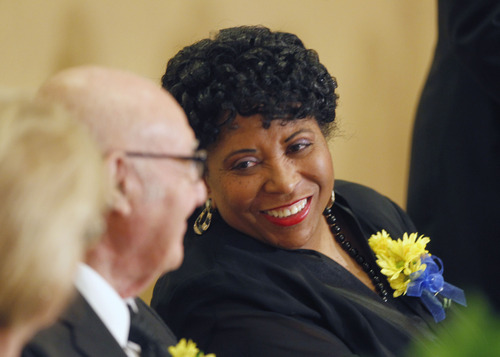This is an archived article that was published on sltrib.com in 2013, and information in the article may be outdated. It is provided only for personal research purposes and may not be reprinted.
Nelson Mandela was a man who pursued peace, harmony and justice for all people and cast a long shadow not only over his native South Africa but also across civilization.
Utah is half a world away from South Africa, but here, too, he stood as a beacon of integrity and moral authority.
Native South African Stephen Pretorius has lived in Utah for almost 20 years but, as a young man, he watched Mandela — who died Thursday at age 95 — lead the African National Congress from his prison cell on Robben Island and later as a free man after 27 years of incarceration.
"The country was right on the edge of civil war [when Mandela was released], but he held it together," Pretorius recalled. "He came out of prison and did not hold a grudge [against those who supported apartheid]. And convinced others not to hold a grudge, as well."
Pretorius, who is white, described Mandela as "a modern-day Gandhi."
"I have nothing but admiration for him," Pretorius said. "He is the most popular president South Africa ever had, white or black."
During the mid-1980s, a movement across the world sought to disinvest in corporations that did business with South Africa in an effort to drive the Afrikaner-dominated National Party from power, recalled former Utahn Tom Price.
Price was among a group of University of Utah students who built a shantytown on campus to symbolize the injustice of the apartheid system. They demanded that the U. divest its holdings in corporations that traded with South Africa.
Mandela gave the world "permission and the obligation" to look at an immoral system and act, Price said.
"It's hard to overstate how important Nelson Mandela's moral authority was in enabling people in Utah and elsewhere to feel authorized to take action against the South African government," Price said. "From his jail cell, he said we have to choke off the lifeblood of this government."
After an 18-month legal tussle over the shantytown, the U. agreed to divest its South African holdings.
Later, on a trip to South Africa, Price said residents there told him the divestment movement made a significant contribution in driving the National Party from power.
"Mandela spoke with a moral authority that was beyond dispute," Price said. "It's heartbreaking to think of a world without a Mandela in it."
Mandela won the Nobel Peace Prize in 1993 with Frederik Willem de Klerk, who ceded power to the black majority.
The Rev. France Davis, of Salt Lake City's Calvary Baptist Church, said Mandela's ability to communicate to all people, including the Afrikaners, was part of his greatness.
"He had a way of relating to people that was not offensive," Davis said. "He had a way to relate to peers and [political] superiors and the common people."
But it was Mandela's unwavering commitment over many decades to the cause of justice and fairness to all people that will cement him in history, Davis said.
"He demonstrated that by fighting, during imprisonment and after his release," he said. "It was commitment, no matter the cost."
Utahn Jeanetta Williams met Mandela at the White House in 1994 and was impressed with his soft-spoken magnanimity.
Williams, who is president of the NAACP Salt Lake Branch, said there were parallels between the African and American civil-rights movements. At the White House meeting, Mandela told her that the ANC had learned from the NAACP and Martin Luther King Jr.
She later visited his cell on Robben Island.
"He brought South Africa to what it is today ... ," she said. "He is the father of South Africa."
Tribune reporter Lindsay Whitehurst contributed to this story. —
Other Utah reactions
"With the rest of the world, we mourn the passing of revered statesman Nelson Mandela. His courage, kindness and extraordinary moral leadership have been an example to all people. We express our love and sympathies to his family and the people of South Africa as they remember his extraordinary life."
LDS Church First Presidency
"Today, South Africa and the world lost one of its greatest leaders and freedom fighters with the passing of Nelson Mandela. From combatting the immoral apartheid regime to his time presiding over the country's peaceful transition to democracy as president of South Africa, Nelson Mandela's dignity, courage and conviction made him a lion among men. Who but Nelson Mandela could have healed such a wounded and divided nation through peaceful means — not violent retribution — and bring South Africa into the modern age where discrimination by race is not tolerated. To his family and the people of South Africa, the world mourns with you. The loss of such a great man will be felt and borne by us all."
Sen. Orrin Hatch, R-Utah







